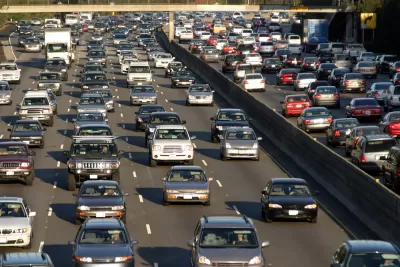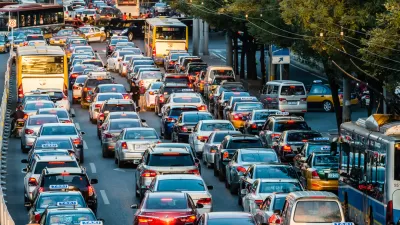A new analysis looks at how income and population density are related to car ownership and some ways that the design of cities can help lessen car dependence.

Henry Grabar writes about trends in car ownership rates and the relationship to the income levels and population density of cities. He asked Issi Romem of Trulia to analyze data for metropolitan areas across the country:
Here’s what Romem found: In dense, transit-rich cities like New York and Boston, vehicle ownership is more closely linked to population density than to income. What kind of neighborhood you live in is likely to align with whether you own a car, or two. In places like Los Angeles and Houston, vehicle ownership is much more closely tied to income. Families who make more money buy more cars.
He notes that some cities show a mix of factors. In Chicago, for example, the lowest-income areas have low car ownership rates, but ownership rates increase both with income and density. "On average, Romem finds, rising income and falling population density have approximately the same positive correlation with car ownership," says Grabar.
Grabar considers what these findings mean for policy and environmental initiatives like the Green New Deal. He suggests that city designs that support car driving as a choice rather than a necessity would provide the biggest environmental and social benefits.
"We can try to build more cities like these, where jobs are accessible by fast, frequent transit and housing is dense enough to support walkable amenities. Or we can make it possible for more people to live in the neighborhoods that have gotten something right," he concludes.
FULL STORY: Where Rich People Don’t Own Cars

Alabama: Trump Terminates Settlements for Black Communities Harmed By Raw Sewage
Trump deemed the landmark civil rights agreement “illegal DEI and environmental justice policy.”

Study: Maui’s Plan to Convert Vacation Rentals to Long-Term Housing Could Cause Nearly $1 Billion Economic Loss
The plan would reduce visitor accommodation by 25% resulting in 1,900 jobs lost.

Planetizen Federal Action Tracker
A weekly monitor of how Trump’s orders and actions are impacting planners and planning in America.

Waymo Gets Permission to Map SF’s Market Street
If allowed to operate on the traffic-restricted street, Waymo’s autonomous taxis would have a leg up over ride-hailing competitors — and counter the city’s efforts to grow bike and pedestrian on the thoroughfare.

Parklet Symposium Highlights the Success of Shared Spaces
Parklets got a boost during the Covid-19 pandemic, when the concept was translated to outdoor dining programs that offered restaurants a lifeline during the shutdown.

Federal Homelessness Agency Places Entire Staff on Leave
The U.S. Interagency Council on Homelessness is the only federal agency dedicated to preventing and ending homelessness.
Urban Design for Planners 1: Software Tools
This six-course series explores essential urban design concepts using open source software and equips planners with the tools they need to participate fully in the urban design process.
Planning for Universal Design
Learn the tools for implementing Universal Design in planning regulations.
Caltrans
Smith Gee Studio
Institute for Housing and Urban Development Studies (IHS)
City of Grandview
Harvard GSD Executive Education
Toledo-Lucas County Plan Commissions
Salt Lake City
NYU Wagner Graduate School of Public Service





























